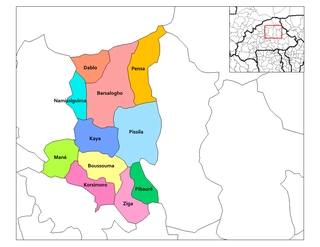On December 24, 2019, militants from the Islamic State in the Greater Sahara attacked the Burkinabe government military base in Arbinda, Sahel Region, Burkina Faso along with the town of Arbinda itself. The attack was halted due to French and Burkinabe air intervention, although 35 civilians were killed in the jihadists' massacre. The Arbinda attack was the deadliest incident in the jihadist insurgency in Burkina Faso in several years.

On 4 and 5 June 2021, jihadists from Jama'at Nasr al-Islam wal-Muslimin (JNIM) attacked the village of Solhan, Yagha Province, Burkina Faso. At least 160 people were killed in the massacres, making it the deadliest attacks up to that point in the jihadist insurgency in Burkina Faso since the start of the war in 2015.

An ongoing war and civil conflict between the Government of Burkina Faso and Islamist rebels began in August 2015 and has led to the displacement of over 2 million people and the deaths of at least 10,000 civilians and combatants.
On June 11, 2022, jihadists from the Islamic State in the Greater Sahara attacked the town of Seytenga, Séno Province, Burkina Faso, killing over a hundred civilians in a massacre. The massacre occurred after Burkinabe forces evacuated the city following ISGS' takeover of the Burkinabe base in the town on June 9.
The Mondoro attack took place on 4 March 2022, when al-Qaeda-linked jihadists attacked a Malian military base, causing heavy casualties.
The Karma massacre was a massacre in the village of Karma, Ouahigouya Department, Burkina Faso on April 20, 2023 perpetrated by soldiers of the Rapid Intervention Brigade's 3rd Battalion in response to the Aorema attack by jihadists that killed several soldiers and civilians a few days prior. The Karma massacre was one of the deadliest massacres of the jihadist insurgency in Burkina Faso, and up to that point the deadliest perpetrated by government forces.
On September 4, 2023, clashes broke out between jihadists from Jama'at Nasr al-Islam wal-Muslimin and Burkinabe soldiers backed by pro-government VDP militiamen in the village of Koumbri, Yatenga Province, Burkina Faso. The battle left over fifty Burkinabe soldiers and militiamen dead and an unknown number of jihadists killed.
Between April 29 and 30, 2017, French forces launched an offensive against jihadists from Ansarul Islam and Jama'at Nasr al-Islam wal Muslimin based in the Foulsaré forest in southern Mali. The operation was dubbed Operation Bayard by the French.
On March 5, 2017, jihadists from Jama'at Nasr al-Islam wal Muslimin attacked Malian forces in Boulikessi. The attack was the first by JNIM since its inception that month.
On February 28, 2024, jihadists from Jama'at Nasr al-Islam wal Muslimin attacked the Malian military camp in Kwala, a village near Mourdiah, Mali. The attack was the first suicide car bombing by the group since 2022, and was part of a campaign by JNIM to expand influence in Koulikoro Region. Over thirty Malian soldiers were killed in the attack.

On August 24, 2024, jihadists from Jama'at Nasr al-Islam wal-Muslimin (JNIM) killed over 600 civilians digging trenches for the Burkinabe government around the town of Barsalogho, Sanmatenga Province, Burkina Faso. The massacre is the deadliest in Burkinabe history, and the deadliest attack in the jihadist insurgency in Burkina Faso.
On December 27, 2018, jihadists from Jama'at Nasr al-Islam wal-Muslimin attacked Burkinabe soldiers in Loroni, northern Burkina Faso, killing ten soldiers. The attack was the deadliest incident for Burkinabe forces since the Nassoumbou attack in 2016.
On August 19, 2019, jihadists from the Islamic State in the Greater Sahara attacked Burkinabe forces in Koutougou, Soum Province, Burkina Faso. 24 Burkinabe soldiers were killed in the attack, and Burkinabe authorities were forced to abandon military outposts in several northern Burkinabe towns following the attack. The attack was the deadliest jihadist attack in Burkinabe history up to that point.
On August 18, 2021, jihadists from Jama'at Nasr al-Islam wal-Muslimin ambushed a convoy of Burkinabe soldiers and civilians near Boukouma, Séno Province, Burkina Faso. The ambush sparked clashes between the jihadists and the soldiers, leaving dozens dead on both sides. At least 65 civilians were killed in the ambush as well.
On November 14, 2021, jihadists from Ansarul Islam and Jama'at Nasr al-Islam wal-Muslimin attacked the mining town of Inata, Burkina Faso, the last place in Djibo Department under Burkinabe government control at the time of the attack. The Burkinabe outpost in Inata was overrun and over fifty soldiers were killed. The attack was the deadliest ambush against Burkinabe forces since the start of the jihadist insurgency in Burkina Faso in 2015, and was a primary reason for the January 2022 Burkina Faso coup d'état.
On May 21, 2022, jihadists from Jama'at Nasr al-Islam wal-Muslimin attacked the city of Bourzanga, Burkina Faso, but the attack was repelled by Burkinabe and French forces.
The Tin-Ediar attack or Déou attack occurred on February 17, 2023 when Burkinabe soldiers were ambushed by the Islamic State – Sahil Province (ISGS) near the village of Tin-Ediar while travelling between Déou and Oursi, Burkina Faso. Over 70 Burkinabe soldiers were killed in the ambush, and Burkinabe authorities stated 160 ISGS fighters were killed.
On March 31, 2024, jihadists from Jama'at Nasr al-Islam wal-Muslimin attacked Burkinabe forces in Tawori, Tapoa Province, Burkina Faso. Over seventy Burkinabe soldiers were killed and thirty-two civilians were killed during the attack and the subsequent massacre.
Throughout May 2024, a convoy carrying soldiers from the Burkina Faso Armed Forces and the Volunteers for the Defense of the Homeland committed several massacres against civilians in eastern Burkina Faso, killing at least 400 civilians during the convoy's journey between April 27 and May 10. The massacres occurred in a similar area to the Nondin and Soro massacres and Bibgou and Soualimou massacres that occurred a few months earlier.
On December 10, 2024, jihadists from the Islamic State – Sahel Province attacked Nigerien soldiers at a market in Chetoumane, Tillabéri Region, Niger, killing at least 90 soldiers and over 50 civilians.


